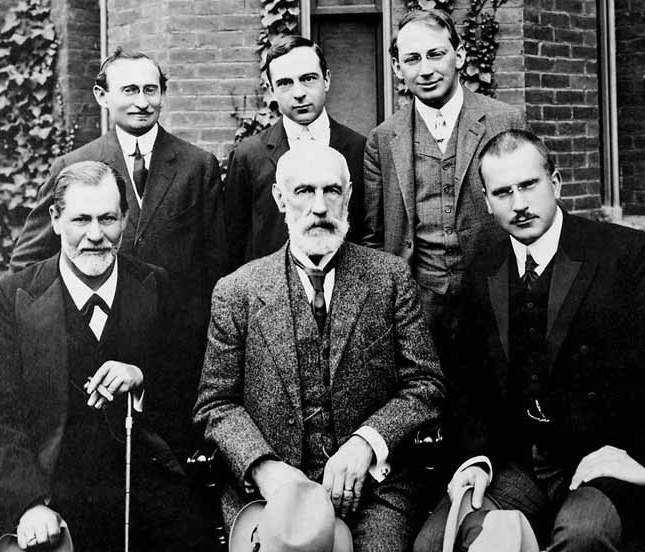|
Getting your Trinity Audio player ready...
|
Above: Front row: Sigmund Freud, G. Stanley Hall, Carl Jung; back row: Abraham Brill, Ernest Jones, Sándor Ferenczi (1909).
Carl Trueman’s book The Rise and Triumph of the Modern Self is a true genealogy of one branch of modernity. Although published in 2020, I recently completed reading the book and wanted to recommend it to those who had not yet come across it.
Trueman’s burden is to discover, in the history of the past 300 years, how the phrase “I’m a man trapped in a woman’s body” came to be regarded as coherent and meaningful by the man on the street.
What needed to occur for the huge assumptions that underpin this thought to become part of the popular imagination, or in Charles Taylor’s phrase, the “social imaginary?” How is it that abstaining “from sex in today’s world is to sacrifice true selfhood as the world around understands it”?
Tracing a new understanding of selfhood that arose in the enlightenment era and especially the age of Romanticism, Trueman presents the rise of “the psychological man.” Spearheaded by Rousseau and further developed by poets such as Shelley, Blake, and Wordsworth, a view of the human self “focused on the inner life of the individual” emerged and joined with a conception of society and culture as oppressive—specifically in regards to the Christian conception of monogamous marriage.
Following this new individualism, Nietzche, Marx, and Darwin presented history as a struggle of power, both philosophically and scientifically. “These three effectively strip away the metaphysical foundations for both human identity and for morality, leaving the latter, as Nietzche is happy to point out, a matter of mere taste and manipulative power games.” Truman shows that by the end of the nineteenth century, via the denial of philosophical and natural telos in man (espoused by atheist moral relativity and Darwinian evolution), the “foundations have…been laid for an iconoclastic view of the past—for seeing history as a tale of oppression and for making its victims into the real heroes of the narrative.”
Once the self is psychologized, Sigmund Freud—in the cool, scientific language increasingly assumed to betoken objective rationality—transforms the psychological individual into the sexual individual through a sexualizing of psychology. A “heady mix of sex and politics” results in the following decades as “certain Marxist thinkers” (Wilhelm Reich and Herbert Marcuse in particular) synthesize “oppression as a fundamentally psychological category and sexual codes as its primary instruments.” Surprisingly perhaps, but with a certain skewed logic, “the political concerns of Marxism” are joined in “a shotgun wedding” to the “psychoanalytical claims of Freud.”
Having traced this background, Trueman can dive more deeply into various currents which have led to the contemporary phase of the sexual revolution as manifested in transgenderism. Trueman does not indulge in jeremiads; a rigorous scholar, his primary aim in this book is not to lament or even offer remedies but to “first explain an action, an idea, or an event in context.” As he says, “understanding the times is a precondition of responding appropriately to the times” and that requires an understanding of history.
While the groups represented by the various letters of LGBTQ+ might seem a united front, Trueman demonstrates that their union is based on shared enemies (traditional sexual mores and the sexual binary), not shared or even compatible values. Many of them agree that “reality is inward and psychological, not outward and natural” but “that is not really to say very much at all.” The last chapters of Trueman’s book explore the “triumphs of the revolution,” from the triumph of the erotic and therapeutic to the “triumph of the T.”
“The world of psychological man is a world in which, to borrow Marx’s phrase, all that is solid is constantly in danger of melting into the air—including ourselves.” Consequently, since even conservative Christians today have absorbed so much of this “social imaginary,” it is crucial to recognize and understand what air it is that we are (unconsciously) breathing.
Anyone who wishes to attain a deeper understanding of the road to “cultural amnesia, expressive individualism, and sexual revolution” should take serious time with this carefully researched and well written tome.
The Rise and Triumph of the Modern Self is available from the publisher, as well as on Amazon, in hardcover, ebook, and audible formats.


